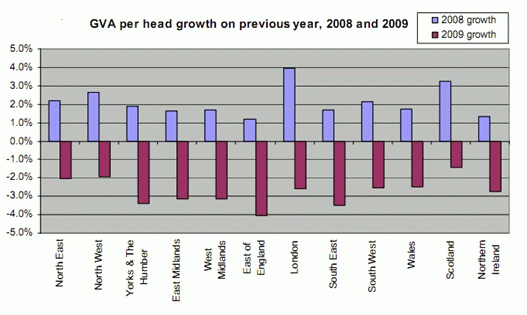It was widely expected that London would be the most severely hit of the UK regions in the recession brought about by the 2007-08 financial crisis. London was more reliant on financial services, it was argued, and because financial services were most directly affected, incomes and employment were expected to fall harder than in other cities (Oxford Economics 2008).
But this has not turned out to be the case. Both income and employment in London have fared better than expected. The latest data show that London’s income per capita fell by 2.5% between 2008 and 2009, while it fell by 2.9% in England as a whole. Only the North East and North West had smaller falls than London, at around 2%. But between 2007 and 2008, London grew nearly twice as fast as those two regions and, of course, London was already much richer (see Figure 1). In terms of employment, the UK saw peak-to-trough falls of 3.9%, whereas London saw only a 2.6% fall. The latest sub-national labour market figures (for the change from Q4 2009 to Q4 2010) show that in the last year, relative to other regions, London experienced the highest increase in economic activity rates, above average increases in employment, the third lowest increase in unemployment (after the South East and South West) and the largest fall in the economic inactivity rate.
Figure 1. Gross value added-per-head growth on previous year, 2008 and 2009
Source: Statistics.gov.uk
House prices tell a similar story. Data from the Department for Communities and Local Government shows that between March 2008 and January 2011 (using three month averages), house prices rose 0.6% in London, compared with a fall of 3.2% in the South East. The Midlands and North West regions saw falls in excess of 6.0% while in the North East and Yorkshire house prices fell at least 9%.
There were also many other signs that the capital was holding up and that Londoners were happier than ever to spend on luxuries. There was a growth in theatre box office takings between 2008 and 2009. And between 2007 and 2010, the average attendance at Premiership football matches in London was flat, while it fell by 6% in the Midlands and by 5% in the North. As a colleague remarked, “it feels like London got away with it”.
How did London get away with it?
But if London did get away with it, how did it do it? One crucial factor is that the recession has not been as bad for the middle classes as expected. According to the Labour Force Survey, for England as a whole, professional and service occupations were less badly affected than administrative, trade and basic occupations. This helps the South as professional occupations account for a larger proportion of the labour force – nearly 50%, compared with under 40% in the Midlands and the North.
Reinforcing this overall trend, London’s employment in professional occupations held up particularly well and London also performed better in administrative, trade, and service occupations. Only in the lower-skilled occupations did London fare worse.
Understanding why the professions fared better in London than in the rest of the UK is difficult. It’s unlikely to be explained by public sector employment. Only in the South East does public sector employment account for a lower share of the economy. The same is true for public sector expenditure as a percentage of overall expenditure. An outflow of illegal immigrants, differences in the effect on hours worked, and real wages may all have played a minor role.
London has higher house prices, so the impact of interest rates on mortgage payments has been larger. But as with fiscal policy, relative to expenditure there is not a big differential with the rest of the country. In contrast, the impact on the very wealthy probably worked against London, at least initially. The overall wealth of the UK’s richest 1,000 people fell by £77 billion between 2007 and 2009 although all of this decline was reversed between 2009 and 2010 (when wealth grew by £77 billion).
Could the bailout of the banks have played a role? Again, this is a surprisingly difficult question to answer. The Office for National Statistics hasn’t yet produced the regional distribution of jobs directly affected by the government bailout of the banks. Looking at what happened to public sector employment by region, when these workers get reclassified gives a rough approximation. This suggests that London had the highest share of ‘bailout’ jobs, i.e. around 16% of the 220,000 jobs affected.
Turning to the indirect effect of bank bailouts, Andrew Haldane of the Bank of England estimates that reduced risk because of government measures saved the banks £107 billion in interest costs in 2009 (see Haldane 2010 for a wider discussion). More than 90% of this went to the big five – HSBC, Barclays, RBS, HBOS and Lloyds – all of which are disproportionately represented in London. We do not yet know the impact of this on the London economy, although according to the Workforce Jobs survey, while employment in financial services fell by 10% in the North, it rose by 5% in the South East.
At least one other government intervention also disproportionately benefited London. The Olympic site currently employs 10,000 workers, and Crossrail a further 2,000. Again, we do not know the full impact on the London economy, although according to the Workforce Jobs survey, between 2007 and 2010 employment in construction fell by twice as much in the North as it did in the South East, i.e. 16% versus 8%. The relatively smaller decline in housing starts also plays a role in explaining these differences (between 2008 and 2010 housing starts fell by around 35% in the South, more than 60% in the North).
So where does all of this leave us? First, relative to both other regions of the UK and to expectations, London appears to have got away with it. The over-representation of the professional occupations partly explains this. The bailout may explain why these occupations did even better in London. But other explanations are possible. The shift in financial sector employment may be driven by the increased importance of timely information flows when things turn bad. Despite improvements in information and communications technology, economists still think that spatial proximity plays an important role in exchanging information.
Alternatively, London may be benefiting from the depth and breadth of its labour market. Our recent research with SERC suggests that the most talented people are highly concentrated in London (Gibbons et al. 2010). There is more research to be done to understand whether these economic mechanisms have played a role.
Finally, there are three important things to note.
- First, to the extent that the bailout of the banking sector explains London’s performance, London mayor Boris Johnson may be right to worry about “banker bashing”.
- Second, despite its relatively good performance, London has still experienced a recession and growth continues to be sluggish.
The recent growth figures suggest that the UK may have experienced no growth in the final quarter of 2010. The tightening of fiscal policy, public sector job cuts, and rises in interest rates all pose risks for recovery and London is certainly not immune to these risks, even if it may be better placed to cope than other parts of the UK.
- Third, some Londoners didn’t get away with it. The bottom end of the London labour market has seen falls in employment in line with the UK average.
This contrasts with other broad occupational categories all of which did better in London. Housing (and other) benefit reforms will hit London and the South East particularly hard. London may have got away with it so far, but things certainly do not look so rosy for London’s poor.
Editor's note: An earlier version of this article appeared in the LSE's Centrepiece magazine
References
Gibbons, Steve, Henry Overman and Panu Pelkonen (2010) ‘Wage Disparities in Britain: People or Place?”, SERC Discussion Paper 60.
Haldane, Andrew (2010), “The $100 billion question”, Comments given at the Institute of Regulation & Risk, Hong Kong, 30 March.
Oxford Economics (2008), Economic Outlook, July.




